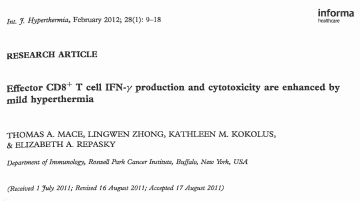Łagodna hipertermia zwiększa produkcję i cytotoksyczność limfocytów efektorowych CD8+ przez IFN-ɣ
tytuł oryg.: Effector CD8+ T cell IFN-ɣ production and cytotoxicity are enhanced by mild hyperthermia
Wydawnictwo: International Journal of Hyperthermia
Autor główny: Elizabeth A. Repasky
Pozostali autorzy: Thomas A. Mace, Lingwen Zhong, Kathleen M. Kokolus
Data: 2012-02-28

DOI: 10.3109/02656736.2011.616182
Język publikacji: Angielski
Klasa publikacji: Artykuł badawczy
Abstract. Purpose: Clinical trials combining hyperthermia with radiation and/or chemotherapy for cancer treatment have resulted in improved overall survival and control of local recurrences. The contribution of thermally enhanced anti-immune function in these effects is of considerable interest, but not understood; studies on the fundamental effects of elevated temperature on immune effector cells are needed. The goal of this study is to investigate the potential of mild hyperthermia to impact tumor antigen-specific (Ag) effector CD8+ T cell functions.
Methods: Pmel-1 Ag-specific CD8+ T cells were exposed to mild hyperthermia and tested for changes in IFN-ɣ production and cytotoxicity. Additionally, overall plasma membrane organisation and the phosphorylation of sygnalling proteins were also investigated following heat treatment.
Results: Exposing effector Pmel-1-specific CD8+ T cells to mild hyperthermia (39.5°C) resulted in significantly enhanced Ag-specific IFN-ɣ production and tumour target cell killing compared to that seen using lower temperatures (33° and 37°C). Further, inhibition of protein synthesis during hyperhermia did not reduce subsequent Ag-induced IFN-ɣ production by CD8+ T cells. Correlated with these effets, we observed a distinct clustering of GM1+ lipid microdomains at the plasma membrane and enhanced phosphorylation of LAT and PKCÐ which may be related to an observed enhancement of Ag-specific effector CD8+ T cell IFN-ɣ gene transcription following mild hyperthermia. However, mitogen-mediated production of IFN-ɣ, which bypasses T cell receptor activation with antigen, was not enhanced.
Conclusions: Antigen-dependent effector T cell activity is enhanced following mild hyperthermia. These effets could potentially occur in patients being treated with thermal therapies. These data also provide support for the use of thermal therapy as an adjuvant for immunotherapies to improve CD8+ effector cell function.
Potrzebujesz więcej danych o artykule? Skontaktuj się z PTHO droga mailową.